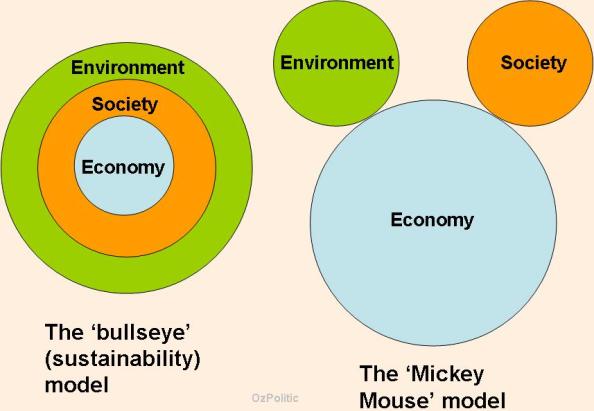If you look at current things that are happening, it is clear that our governance system is using the "mickey mouse model" (right hand diagram below) for sustainability rather than the" strong sustainability" model (left hand diagram) which we have discussed in an earlier blog post. The mickey mouse model focuses almost entirely on the economy and gives passing minimal acknowledgement to the environment and society.
 |
| Image Source |
Example of the mickey mouse model in action: It is widely acknowledged that the expanding dairy industry is having a negative effect on waterways but the high economic value of the dairy industry is making the government reluctant to make the needed changes that will mitigate the problem. Case in point: a bill currently passing through parliament is proposing to maintaining water quality by restricting reservoirs to "secondary contact" levels (i.e. boats are safe, but swimming is not as it allows direct human contact with the water supply). This bill is still subject to change, and this is only part of the wider bill around environmental management. The article linked here highlights some of the concerns about the bill.
The problem with this proposal is that by limiting reservoir access to secondary contact, it is enabling dairy farms to continue many of the current practices minimising the environmental benefits, and it is not acknowledging the societal benefits of allowing people access to enjoy the waterways even though primary contact has very low risk for the quality of the water distributed to our towns.
My interpretation of this bill is that the government is avoiding allowing primary access to waterways as that would require major changes in current dairy farming practice and thus affecting our export earnings. They are opting for the better economic option at the expense of the environment and the people and in the process are disregarding:
- peoples enjoyment of water
- degradation of the water system and the ecosystem within waterways
- quality of our own drinking water
- maintenance of the species that live in the water including native fish
- quality and enjoyment of the sea water from waterway run off
- quality of experience for tourists who come here to enjoy our environment
- costs to the health system from illness that people contract from swimming in contaminated waters, eating produce grown with the water, or drinking water from the potentially contaminated waterways.
If a system conditions approach to this problem was used, rather than just accepting lower standards for immediate economic gain, there would be a real opportunity to improve efficiencies in dairy farming (and other business practices) as well as to return our waterways to being healthy and thriving areas that are safe enjoyable for New Zealanders and tourists.
Please note: while I highlight dairy farming in this example, it is obviously not the only contributor to the degradation of the environment/water quality. We need to look at the bigger picture and use the four system conditions to help audit our current position and to guide improvements for the future.
The above is just one example of the clear disregard for the environment and the bulk of the people, in the current system which favours economics regardless of anything else. Another example that is currently gathering a movement of protest is the TPPA which threatens to undermine the people of New Zealand as well as the environment in favour of international corporates. To read more about this click on this link.
It is my opinion that we need to stand up and voice our concerns about the blatant disregard for the people and the environment in favour of an economic-centric system. If we don't have a healthy environment, we won't have healthy people and a healthy society, and without that economic sustainability will fail to exist.
To read the blog that inspired this post click here.
Back to the planned post of creating a sustainable vision next week!
Have a great week.

No comments:
Post a Comment